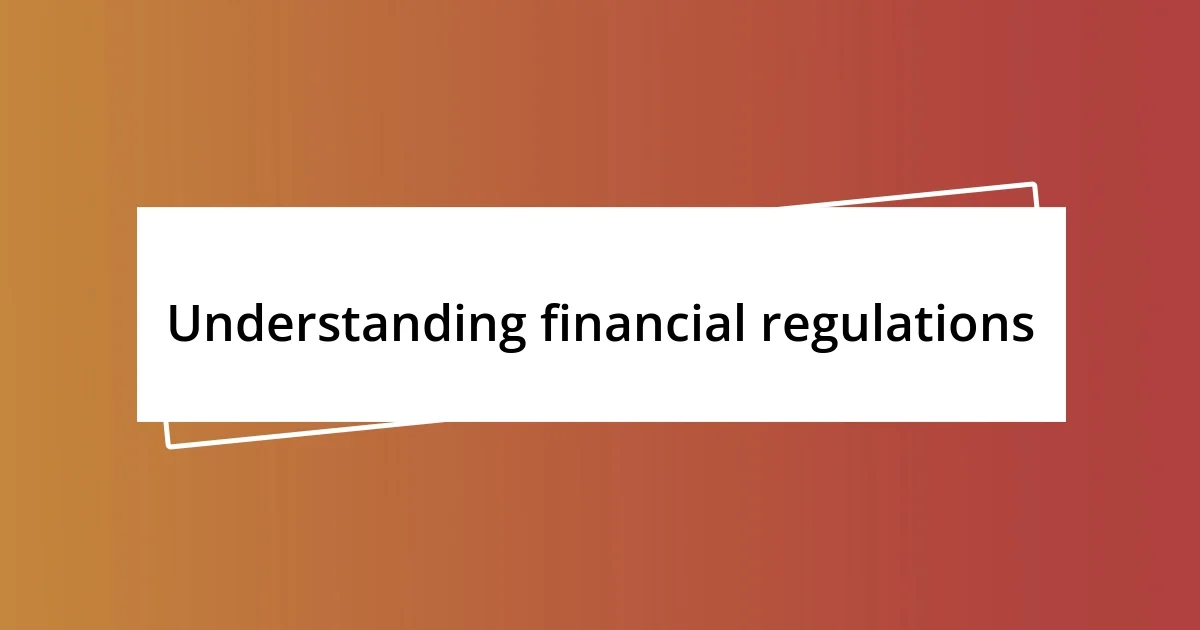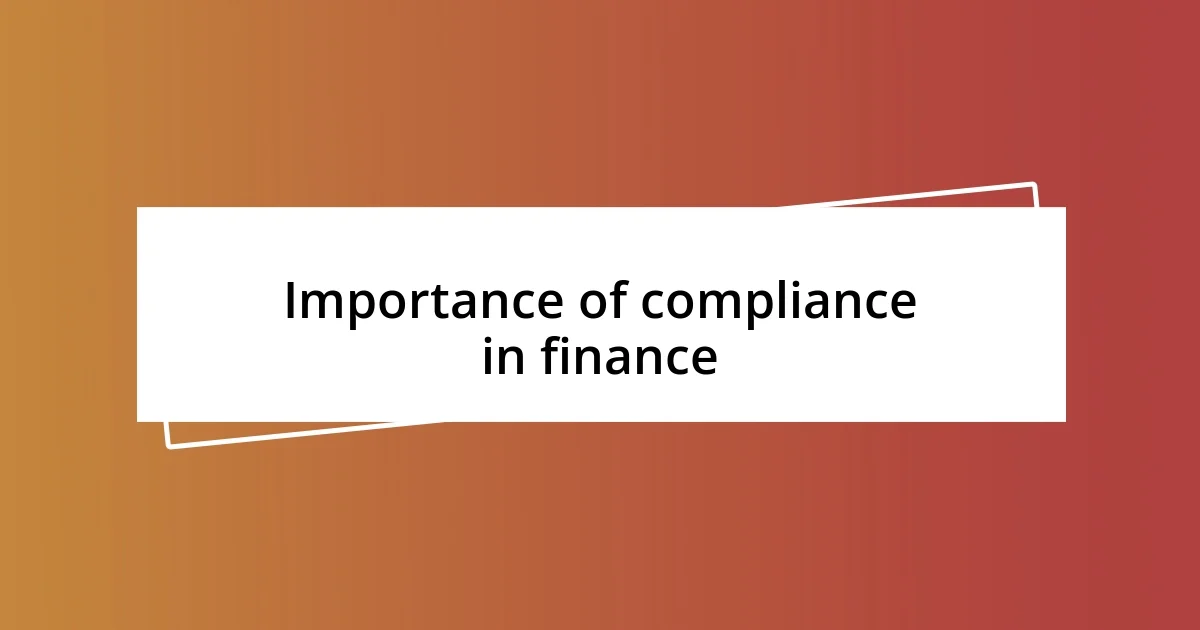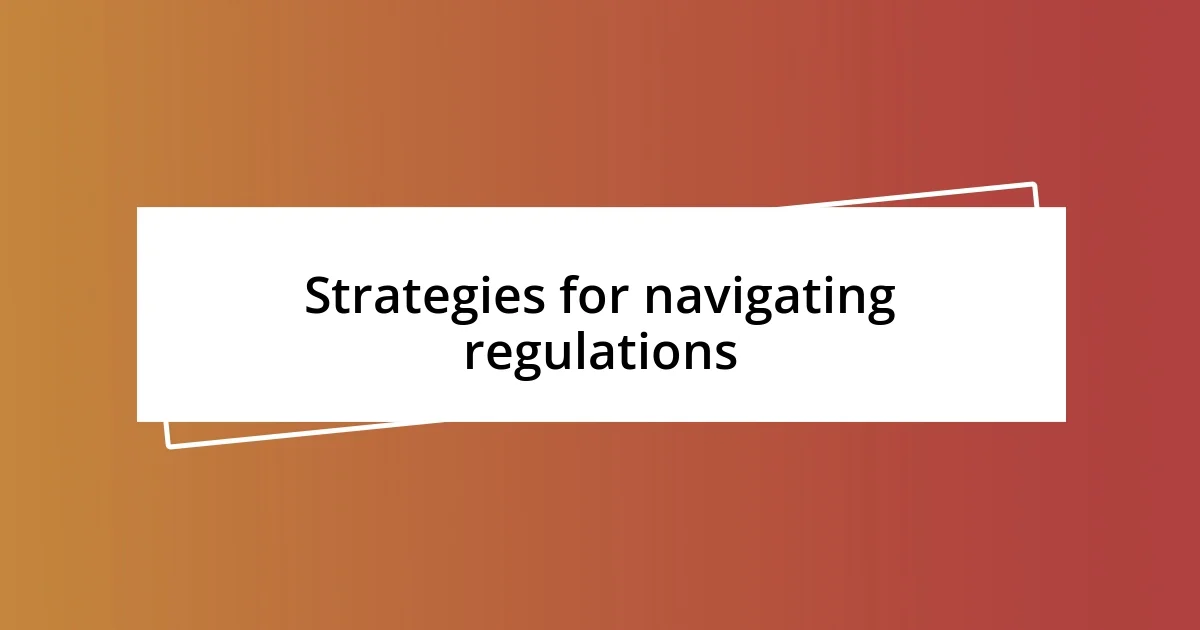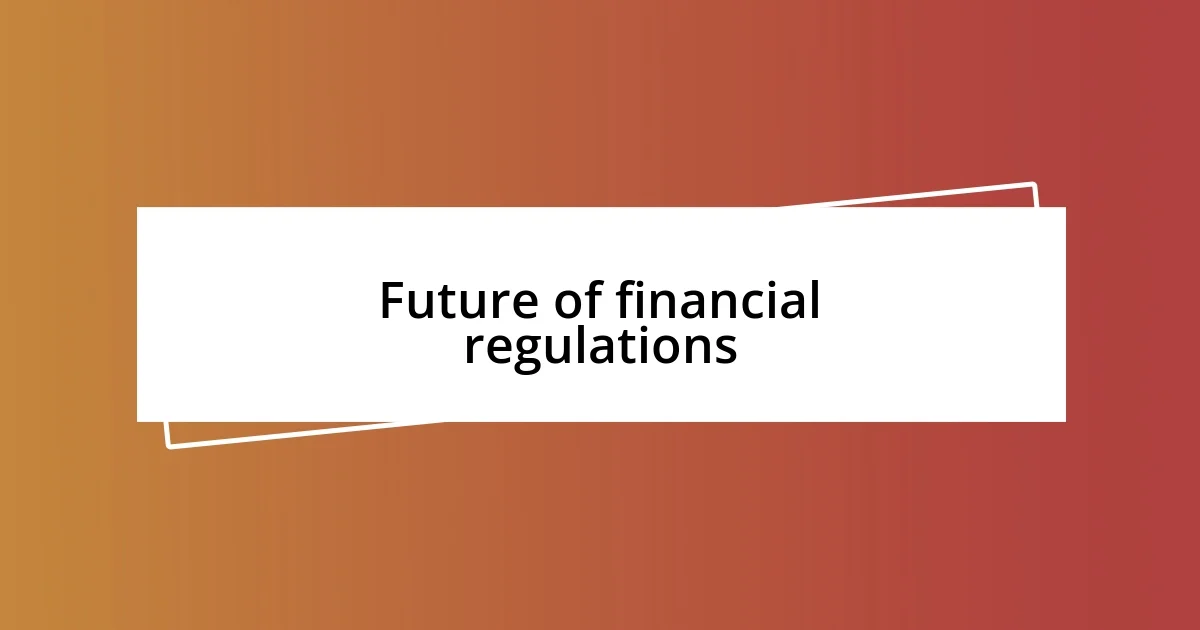Key takeaways:
- Financial regulations are essential for protecting consumers, maintaining market integrity, and ensuring transparent, responsible operations within financial institutions.
- The importance of compliance lies in risk mitigation, consumer trust, market stability, and enhanced operational efficiency, as seen in successful businesses that embrace regulatory requirements.
- Staying updated on financial regulations can be facilitated through industry newsletters, social media, and podcasts, making complex information more accessible and engaging.

Understanding financial regulations
Understanding financial regulations is essential for anyone involved in the financial world. I remember my first encounter with complex regulations; it felt overwhelming, and I didn’t know where to start. Isn’t it fascinating how these rules, often perceived as mere bureaucratic hurdles, actually serve to protect consumers and maintain market integrity?
Financial regulations can sometimes seem dry, but they’re fundamentally about trust and accountability. I’ve seen firsthand how a lack of regulation can lead to chaos, like during the 2008 financial crisis. When I think about it, isn’t it comforting to know that these regulations aim to prevent such turmoil, ensuring that institutions operate transparently and responsibly?
Many might wonder how financial regulations really impact them. Personally, I find it reassuring to understand that these rules help maintain fair competition and protect my investments. It really hits home when I consider the implications of regulations on our day-to-day financial decisions; they shape the environment in which we save, invest, and spend.

Importance of compliance in finance
Compliance in finance is not just a checkbox to tick; it’s the backbone of a stable financial system. I recall when I worked with a startup that overlooked compliance measures. The anxiety was palpable as we navigated uncertain waters, always fearful of potential fines or legal implications that could shut us down. This experience reinforced my belief that compliance is vital for avoiding risks and fostering a culture of ethical behavior within financial institutions.
Here are some key points highlighting the importance of compliance in finance:
- Risk Mitigation: Effective compliance reduces the likelihood of legal issues and financial penalties, protecting both the organization and its stakeholders.
- Consumer Trust: Adhering to regulations builds confidence in financial institutions. I’ve often chosen companies simply because I felt assured they were following the rules.
- Market Stability: Compliance helps maintain a level playing field, which is essential for healthy competition and economic growth.
- Reputation Management: Companies known for strong compliance practices tend to have better reputations, attracting more clients and investors.
- Operational Efficiency: Good compliance frameworks streamline processes, leading to better decision-making and resource allocation within the organization.

Key financial regulations to know
Understanding key financial regulations is fundamental for anyone looking to make informed decisions in today’s markets. For instance, the Dodd-Frank Act was enacted after the 2008 financial crisis to enhance accountability and transparency in the financial system. I remember feeling relieved when my financial advisor explained how these regulations sought to protect consumers from reckless practices, helping restore trust in the economy.
Another critical regulation is the Sarbanes-Oxley Act, which focuses on corporate governance and financial disclosures. When I started investing in individual stocks, knowing that companies had to adhere to stricter reporting requirements made me feel more secure in my decisions. The peace of mind that comes from understanding these regulations truly highlights their importance.
Perhaps one of the most talked-about rules is the Basel III framework, which aims to strengthen bank capital requirements and increase financial resilience. Personally, I’ve always been passionate about sustainability in investing, and it was refreshing to see how these regulations promote fiscal stability while also acknowledging broader economic impacts. Understanding these regulations equips me, and you, with the knowledge to make wiser choices in an increasingly complex financial landscape.
| Regulation | Key Focus |
|---|---|
| Dodd-Frank Act | Consumer protection and market stability |
| Sarbanes-Oxley Act | Corporate governance and financial disclosures |
| Basel III | Bank capital requirements and financial resilience |

Impact of regulations on businesses
Regulations can significantly influence how businesses operate, often shaping strategic decisions that affect their growth and longevity. I remember a consulting project where we advised a mid-sized financial services firm on compliance issues. At first, they resisted the idea, thinking regulations were just obstacles. But once they embraced these requirements, they found new opportunities for efficiency and improved their relationships with clients, realizing that compliance wasn’t a burden but a pathway to trust.
Moreover, some regulations can impose substantial costs on smaller businesses. I once spoke with a friend who runs a boutique finance firm, and he shared his frustrations over the compliance expenses that often felt overwhelming. He even considered shutting down his operations at one point. It made me reflect—doesn’t it seem unfair that small businesses must navigate the same complex regulatory landscape as large corporations, often without the same resources to tackle compliance challenges?
Yet, on the flip side, I’ve observed that businesses that proactively navigate regulations can differentiate themselves in crowded markets. Take, for example, a company I worked with that prioritized transparency in its operations. This commitment to ethical practices attracted clients who valued integrity over mere pricing. It made me wonder, how many businesses are missing out on similar benefits simply because they view regulations as an inconvenience rather than an opportunity?

Strategies for navigating regulations
Navigating financial regulations can feel daunting, but there are strategies that can make this process smoother. For instance, I once attended a workshop focused on compliance best practices, and it opened my eyes to the importance of continuous education. Knowing the latest updates and interpretations of regulations can be a game-changer—how often do we overlook valuable resources that could aid us in understanding complex rules?
Another approach is to leverage technology to simplify compliance. I remember consulting with a financial startup that adopted compliance software, drastically reducing the time spent on regulatory reporting. It was fascinating to see how technology not only improved their efficiency but also minimized human error—an often-overlooked factor in compliance failure. Could embracing such tools be the difference between chaos and clarity in navigating financial landscapes?
Lastly, forming alliances—whether through industry associations or networking groups—can be invaluable. I once joined a local finance group where members shared real-life experiences and insights on regulatory challenges. The camaraderie and shared knowledge made compliance feel less isolating and more manageable. Have you ever considered how connecting with others in your field could transform your regulatory journey?

Future of financial regulations
The future of financial regulations is evolving, especially as technology continues to reshape the industry. Recently, I attended a conference where experts discussed how the rise of fintech and digital currencies is prompting regulatory bodies to rethink their approaches. It’s fascinating to consider—how might future regulations level the playing field for new entrants while ensuring consumer protection?
I’ve observed that regulators are becoming increasingly aware of the need for flexible frameworks. A colleague of mine who works with a regulatory agency shared stories of how they are engaging with industry leaders to create adaptive policies. This collaborative approach allows for innovation without compromising on security, which is a win-win for everyone involved. Don’t you think that this engagement could be the key to crafting regulations that truly serve the dynamic nature of our financial landscape?
Looking ahead, I believe there will be an emphasis on transparency in regulatory processes. During a recent discussion with a compliance officer, they expressed optimism about initiatives aimed at making regulations more comprehensible and accessible. It struck me as vital—how would a clearer framework impact not just compliance for businesses but also enhance public trust? I foresee that embracing transparency will be crucial for building stronger relationships between regulators, businesses, and consumers alike.

Resources for staying updated
Staying updated on financial regulations is essential, and I’ve found a few resources that can be incredibly helpful. For instance, I subscribe to industry newsletters that deliver timely updates directly to my inbox. It’s such a relief not to have to sift through endless websites; the curated content is like a cheat sheet for keeping up with changes. How often do we truly appreciate the value of curated information in our fast-paced lives?
I also enjoy following regulatory bodies on social media. Recently, I came across a Twitter thread from a prominent regulatory agency that explained the implications of a new policy in an engaging way. This informal, real-time communication provided insights that traditional media often overlooks. Have you ever considered how social media can bridge the gap between complex regulations and everyday understanding?
Finally, podcasts have become one of my go-to resources. I remember listening to a fascinating episode featuring experts discussing the latest trends in compliance. Their lively discussions made intricate topics feel accessible and relevant. It got me thinking—how can we leverage various mediums to make financial regulations not just bearable but engaging?














